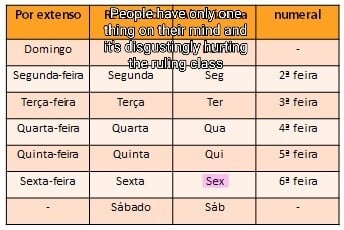Portuguese day names are the only ones that make sense.
196
Be sure to follow the rule before you head out.
Rule: You must post before you leave.
Other rules
Behavior rules:
- No bigotry (transphobia, racism, etc…)
- No genocide denial
- No support for authoritarian behaviour (incl. Tankies)
- No namecalling
- Accounts from lemmygrad.ml, threads.net, or hexbear.net are held to higher standards
- Other things seen as cleary bad
Posting rules:
- No AI generated content (DALL-E etc…)
- No advertisements
- No gore / violence
- Mutual aid posts are not allowed
NSFW: NSFW content is permitted but it must be tagged and have content warnings. Anything that doesn't adhere to this will be removed. Content warnings should be added like: [penis], [explicit description of sex]. Non-sexualized breasts of any gender are not considered inappropriate and therefore do not need to be blurred/tagged.
If you have any questions, feel free to contact us on our matrix channel or email.
Other 196's:
Lots of other languages have days named after the sun, moon, and 5 planets or the gods associated with the planets. Obviously we have Sunday and Monday, or lunes in Spanish, but that's also why in Spanish, Mars = Marte, Tuesday = Martes. Probably most famously in English is Thursday coming from Thor's day (Þunras dag) with Thor being the equivalent to Zeus or Jupiter, which is where jueves comes from in Spanish. In Spanish though their sun-day got remained to God's day (domingo) and saturn-day to sabbath (sabado). Probably most interesting is that the connection even applies to Japanese. The days go in this order: 日月火水木金土 which means "sun moon fire water wood metal earth" which are the classical Chinese 5 elements connected to everything from the 60-year sexagisimal calendar to the bagua tao trigrams on the Republic of Korea flag. And if course, they're also the names of the planets with Mars being fire-planet, Mercury being water-planet, Jupiter being wood-planet, Venus being metal-planet, and Saturn being earth-planet.
So the planet Jupiter (etc.) is to some degree represented in the Thursdays (etc.) of three different languages. Not really saying that this makes more sense than Portuguese, but I think it's cool
I'm more confused why the British start counting week from Sunday.
